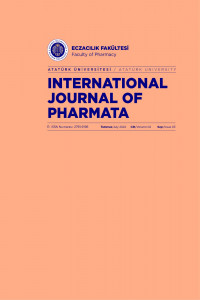Öz
Propolis is one of the ways to protect the colony health and immunity of honey bees, and it is now known that honey bees can protect the colony from many microorganisms by forming a propolis layer inside the nest. This antimicrobial property of propolis and the fact that honey bees use propolis in their nests to kill bacteria and viruses have led scientists to investigate whether it can be used in the treatment against COVID-19. In this review, studies investigating the effectiveness of propolis in the treatment of COVID-19 in the literature were compiled by scanning the PubMed internet database with the terms of propolis, COVID-19, SARS-CoV-2 and novel corona virus. As a result of the search, nine reviews, five research articles, one case report, two preliminary studies and one randomized controlled study were found. From these studies, a study found that it can be used as a promising treatment method by developing a liposomal formulation against COVID-19 using corn propolis. Another study showed that the propolis prevents and inhibits the adhesion of the COVID-19 virus to the ACE2 protein, which was its main target to infect the host cell. They explained that this was due to the fact that the components of caffeic acid, quercetin, kaempferol and myricetin in propolis had a strong interaction with the ACE2 protein. In a study on the enzymatic inhibition of the SARS-CoV-2, it was determined that molecular compounds of propolis showed therapeutic efficacy. As a conclusion, studies have shown that propolis has a promising therapeutic efficacy and can be used in the treatment of COVID-19. However, since most of the studies were experimental, non-clinical studies, and reviews, there is a need for clinical studies with a high level of evidence.
Anahtar Kelimeler
propolis COVİD-19 treatment effectiveness review bee product apitherapy
Kaynakça
- medRxiv C-wgJ. Epidemiological characteristics of COVID-19 cases in Italy and estimates of the reproductive numbers one month into the epidemic. 2020.
- Zhang X, Li S, Niu S. ACE2 and COVID-19 and the resulting ARDS. Postgraduate Medical Journal. 2020;96(1137):403.
- Güler H, Ay Şal F, Can Z, et al. Targeting CoV-2 spike RBD and ACE-2 interaction with flavonoids of Anatolian propolis by in silico and in vitro studies in terms of possible COVID-19 therapeutics. Turkish journal of biology = Turk biyoloji dergisi. 2021;45(4):530-548.
- Refaat H, Mady FM, Sarhan HA, Rateb HS, Alaaeldin E. Optimization and evaluation of propolis liposomes as a promising therapeutic approach for COVID-19. International Journal of Pharmaceutics. 2021;592:120028.
- Sahlan M, Irdiani R, Flamandita D, et al. Molecular interaction analysis of Sulawesi propolis compounds with SARS-CoV-2 main protease as preliminary study for COVID-19 drug discovery. Journal of King Saud University - Science. 2021;33(1):101234.
- Berretta AA, Silveira MAD, Cóndor Capcha JM, De Jong D. Propolis and its potential against SARS-CoV-2 infection mechanisms and COVID-19 disease: Running title: Propolis against SARS-CoV-2 infection and COVID-19. Biomedicine & Pharmacotherapy. 2020;131:110622.
- Silveira MAD, De Jong D, Berretta AA, et al. Efficacy of Brazilian green propolis (EPP-AF®) as an adjunct treatment for hospitalized COVID-19 patients: A randomized, controlled clinical trial. Biomedicine & Pharmacotherapy. 2021;138:111526.
- Zorlu D. COVID-19 and Anatolian propolis: A case report. Acta Medica Mediterranea. 2021;37:1229.
Öz
Kaynakça
- medRxiv C-wgJ. Epidemiological characteristics of COVID-19 cases in Italy and estimates of the reproductive numbers one month into the epidemic. 2020.
- Zhang X, Li S, Niu S. ACE2 and COVID-19 and the resulting ARDS. Postgraduate Medical Journal. 2020;96(1137):403.
- Güler H, Ay Şal F, Can Z, et al. Targeting CoV-2 spike RBD and ACE-2 interaction with flavonoids of Anatolian propolis by in silico and in vitro studies in terms of possible COVID-19 therapeutics. Turkish journal of biology = Turk biyoloji dergisi. 2021;45(4):530-548.
- Refaat H, Mady FM, Sarhan HA, Rateb HS, Alaaeldin E. Optimization and evaluation of propolis liposomes as a promising therapeutic approach for COVID-19. International Journal of Pharmaceutics. 2021;592:120028.
- Sahlan M, Irdiani R, Flamandita D, et al. Molecular interaction analysis of Sulawesi propolis compounds with SARS-CoV-2 main protease as preliminary study for COVID-19 drug discovery. Journal of King Saud University - Science. 2021;33(1):101234.
- Berretta AA, Silveira MAD, Cóndor Capcha JM, De Jong D. Propolis and its potential against SARS-CoV-2 infection mechanisms and COVID-19 disease: Running title: Propolis against SARS-CoV-2 infection and COVID-19. Biomedicine & Pharmacotherapy. 2020;131:110622.
- Silveira MAD, De Jong D, Berretta AA, et al. Efficacy of Brazilian green propolis (EPP-AF®) as an adjunct treatment for hospitalized COVID-19 patients: A randomized, controlled clinical trial. Biomedicine & Pharmacotherapy. 2021;138:111526.
- Zorlu D. COVID-19 and Anatolian propolis: A case report. Acta Medica Mediterranea. 2021;37:1229.
Ayrıntılar
| Birincil Dil | İngilizce |
|---|---|
| Konular | Eczacılık ve İlaç Bilimleri |
| Bölüm | Reviews |
| Yazarlar | |
| Yayımlanma Tarihi | 6 Temmuz 2022 |
| Yayımlandığı Sayı | Yıl 2022 Cilt: 2 Sayı: 3 |


